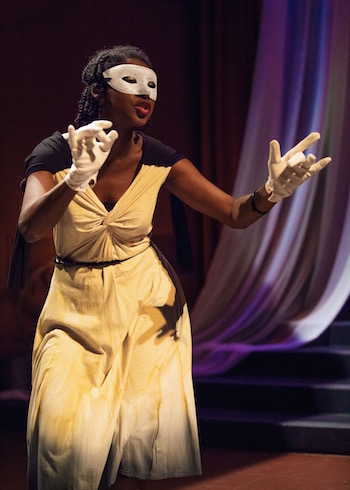Theater Review: Overcoming Silence—”The Love of the Nightingale”
Hub Theatre Company’s production is artfully staged in a challenging, three-quarter round space.
The Love of the Nightingale by Timberlake Wertenbaker. Directed by Rebecca Bradshaw. Presented by Hub Theatre Company at The First Church in Boston through November 21.

Lauren Elias in a scene from Hub Theatre Company’s “The Love of the Nightingale.” Photo: Tim Gurczak.
By Jess Viator
In The Love of the Nightingale, playwright Timberlake Wertenbaker uses the Greek myth of the violent rape and brutal silencing of Philomele to parallel our current struggle with rape and rape culture, focusing on the multiple and pervasive methods of silencing victims. I write, “current struggle,” but this play was written 26 years ago; depressingly, it remains relevant.
Both victims and perpetrators suffer from the effects of silence; longterm suppression often erupts into violence, then violence incurs silence, and so on. The play begins with a movement piece, which introduces us to a stylized gesture that symbolizes violence; it is a contagion, infecting each character in turn, eventually transforming them into senseless beasts that attack indiscriminately, over and over again. We come to learn that silence permeates the culture of Thrace: no one speaks their mind—not even the king—and that silence leads to an endless cycle of violence. The Love of the Nightingale explores the variations that silencing can take, and the consequences.
The kingdom of Thrace came to the aid of Athens, helping them to win a war. In a gesture of gratitude, the king of Athens gives the king of Thrace a prize: his daughter, Procne. Procne (Bridgette Hayes) travels with her new husband, King Tereus (Jeff Marcus), to the far-off Thrace. There, she is unable to form a personal connection with anyone, and is deeply lonely.
The Athenians and the Thracians, though they speak the same language, do not use language the same way. The Athenians pride themselves on their ability to play with words, to philosophize and probe. The Thracians do none of this; they are a culture of hidden truths, and obscured meanings. The chorus of Thracian women do not accept Procne; they all sit together upstage, a middle school lunch table full of derisive cool kids tearing apart the weird, new girl. Procne turns her back on them and the audience commiserates; she doesn’t belong and she doesn’t want to belong. There is a mutual refusal to understand each other. After five years of alienation, Procne asks her husband king to go to Athens and bring her younger sister, Philomele, to Thrace for a visit. Tereus does go to Athens, but finds himself lusting after his wife’s sister; he decides to keep Philomele for himself. When she becomes a problem, he silences her.
Procne spends most of the play being misled, kept in the dark via a silence that surrounds her. She is immobilized by it. Yet still she rebels, repeatedly asking the chorus questions they won’t (or can’t) answer. Bridgette Hayes as Procne expertly shifts through frustration, anger, despair, disbelief, and mortal fear—all the while maintaining her stately and stylized manner.
Jeff Marcus is deeply unsettling as Tereus; he generates fear long before he hurts anyone. The text describes Tereus as a shell of a person filled only with violence—Marcus makes this abstract description memorably concrete. His Tereus terrorizes everyone around him into fearful silence.

Blyss Cleveland in a scene from the Hub Theatre Company’s production of “The Love of the Nightingale.” Photo: Tim Gurczak.
A lifetime of fearful silence has forced Niobi (Liz Adams) into complicity. Philomele’s old woman chaperone is the most complex character in the play; a victim of violence herself, she understands that keeping quiet and giving in is how you survive. Niobi, more than any other character, brings into focus the parallels to modern rape culture; she understands that rape is horrific and wrong, yet accepts it as normal and unavoidable. Liz Adams is heartbreaking in this role; she deftly walks the line between the sympathetic and the despicable. She delivers a gut-punch of a monologue that, through a lemon tree metaphor, asks the primal question: why do men rape? Her bleak answer is—because they can.
Sickeningly, Niobi instructs Philomele (Lauren Elias) to keep silent after her trauma, but Philomele will not—even when her ability to speak is violently ripped from her. Philomele is the heart of the play; she demonstrates how truth-telling and resolute curiosity can make society better. Elias plays the character in a casual manner, sympathetically modern—her performance stands in self-conscious juxtaposition to the stylized presentations of the other cast members. This choice certainly singles Philomele out—she is intended to be an outlier—but the approach is somewhat jarring.
The production is artfully staged in a challenging, three-quarter round space. The scenic design is simple and elegant: gauzy, white fabric hangs from the tall ceilings. Director Rebecca Bradshaw cleverly uses the fabric to evoke various settings: a stage in Athens, a palace in Thrace, the deck of a ship, a city wall. The interspersions of choreography provide a much needed distancing effect in a story that is genuinely upsetting. That said, though movement pieces are well choreographed, they are not always integrated into the rest of the production. The actors sometimes seem self-conscious while performing them. The choreography works best when the three-piece band drives the action. The music is haunting; a discordant cello drone is used to great effect to highlight the more disturbing moments. The Love of the Nightingale is a difficult script to stage in other ways as well, not the least of which is the text itself; the Thracians sometimes speak in non sequiturs. The ensemble’s actors are able suggest the sense behind the sometimes incoherent words.
Taking away a person’s ability to speak is the ultimate cruelty; it strips away their agency, reducing their humanity in tragically effective ways. The Love of the Nightingale tells the a story of a woman who will not be silenced, but its power is not just a matter of inspiration—the script reminds us that the possibility of speaking up is inevitably accompanied by danger.
Jess Viator is an emerging independent theater director, an occasional stage manager, and a lapsed playwright. She has a BA in theater performance, and recently completed a master’s degree in theatre studies from the University of Dundee in Scotland.
Tagged: Hub Theatre Company, Jess Viator, Rebecca Bradshaw, The Love of the Nightingale
